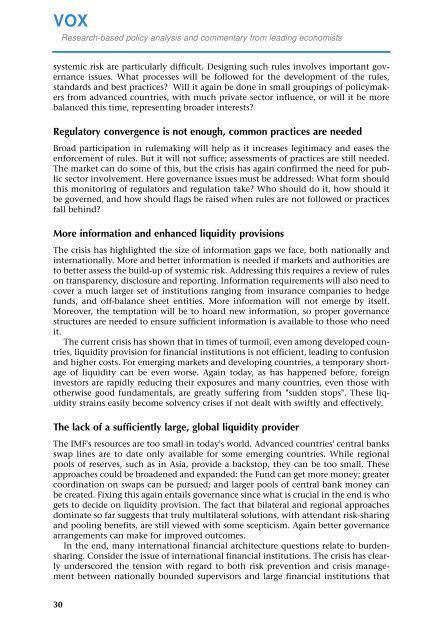What G20 Leaders Must Do To Stabilise our Economy and Fix ... - Vox
What G20 Leaders Must Do To Stabilise our Economy and Fix ... - Vox
What G20 Leaders Must Do To Stabilise our Economy and Fix ... - Vox
Create successful ePaper yourself
Turn your PDF publications into a flip-book with our unique Google optimized e-Paper software.
VOXResearch-based policy analysis <strong>and</strong> commentary from leading economistssystemic risk are particularly difficult. Designing such rules involves important governanceissues. <strong>What</strong> processes will be followed for the development of the rules,st<strong>and</strong>ards <strong>and</strong> best practices? Will it again be done in small groupings of policymakersfrom advanced countries, with much private sector influence, or will it be morebalanced this time, representing broader interests?Regulatory convergence is not enough, common practices are neededBroad participation in rulemaking will help as it increases legitimacy <strong>and</strong> eases theenforcement of rules. But it will not suffice; assessments of practices are still needed.The market can do some of this, but the crisis has again confirmed the need for publicsector involvement. Here governance issues must be addressed: <strong>What</strong> form shouldthis monitoring of regulators <strong>and</strong> regulation take? Who should do it, how should itbe governed, <strong>and</strong> how should flags be raised when rules are not followed or practicesfall behind?More information <strong>and</strong> enhanced liquidity provisionsThe crisis has highlighted the size of information gaps we face, both nationally <strong>and</strong>internationally. More <strong>and</strong> better information is needed if markets <strong>and</strong> authorities areto better assess the build-up of systemic risk. Addressing this requires a review of ruleson transparency, disclosure <strong>and</strong> reporting. Information requirements will also need tocover a much larger set of institutions ranging from insurance companies to hedgefunds, <strong>and</strong> off-balance sheet entities. More information will not emerge by itself.Moreover, the temptation will be to hoard new information, so proper governancestructures are needed to ensure sufficient information is available to those who needit.The current crisis has shown that in times of turmoil, even among developed countries,liquidity provision for financial institutions is not efficient, leading to confusion<strong>and</strong> higher costs. For emerging markets <strong>and</strong> developing countries, a temporary shortageof liquidity can be even worse. Again today, as has happened before, foreigninvestors are rapidly reducing their exposures <strong>and</strong> many countries, even those withotherwise good fundamentals, are greatly suffering from "sudden stops". These liquiditystrains easily become solvency crises if not dealt with swiftly <strong>and</strong> effectively.The lack of a sufficiently large, global liquidity providerThe IMF's res<strong>our</strong>ces are too small in today's world. Advanced countries' central banksswap lines are to date only available for some emerging countries. While regionalpools of reserves, such as in Asia, provide a backstop, they can be too small. Theseapproaches could be broadened <strong>and</strong> exp<strong>and</strong>ed: the Fund can get more money; greatercoordination on swaps can be pursued; <strong>and</strong> larger pools of central bank money canbe created. <strong>Fix</strong>ing this again entails governance since what is crucial in the end is whogets to decide on liquidity provision. The fact that bilateral <strong>and</strong> regional approachesdominate so far suggests that truly multilateral solutions, with attendant risk-sharing<strong>and</strong> pooling benefits, are still viewed with some scepticism. Again better governancearrangements can make for improved outcomes.In the end, many international financial architecture questions relate to burdensharing.Consider the issue of international financial institutions. The crisis has clearlyunderscored the tension with regard to both risk prevention <strong>and</strong> crisis managementbetween nationally bounded supervisors <strong>and</strong> large financial institutions that30














